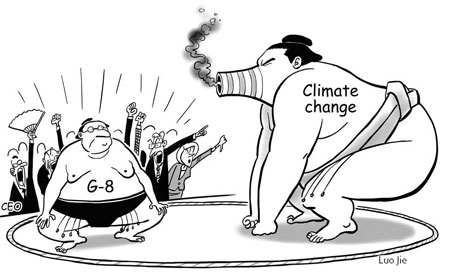
|
OPINION> Commentary
 |
|
A CEO plan for G8 leaders on climate change
(China Daily)
Updated: 2008-07-08 07:29 Climate change is a serious challenge for the international community, including the business community. While some uncertainties remain, applying a risk management perspective to the available information leads us to conclude that a reasonable approach would be for all leaders of business and government to take action now. This is the consensus view of an unprecedented group of 100 CEOs of major companies, of which we are members, drawn from every industrial sector and region. For the past year, we have worked together under the auspices of the World Economic Forum and World Business Council for Sustainable Development to assemble the most detailed set of guidance yet to emerge from the business community regarding the design of the climate policy framework that will succeed the Kyoto Accord. Our message to the G8 leaders' meeting in Japan is that nothing less than a new geometry of international cooperation will be required for the international community to achieve the emission reduction goals recommended by the scientific community in an economically efficient fashion. Where the Kyoto Accord relied almost entirely on a traditional, top-down set of government commitments, we believe the new framework will need to incorporate a more pragmatic and results-oriented mixture of top-down and bottom-up elements aimed at not only increasing the probability that governments will meet their commitments but also enabling them to do so in the least-cost, most pro-growth manner possible. Above all, the new framework should be designed so that clear and predictable incentives are created to enable obvious economic value to be created over the short and long run from emission reductions. It should facilitate the linkage of explicit or implicit carbon values established at various national and regional levels, with the ultimate aim of establishing a deep and liquid international market for carbon that takes into account international competitive pressures. It will be necessary for the new framework to respect the prerogative of national governments to employ the domestic policies best suited to their own national circumstances by allowing variation in the magnitude and timing of countries' commitments provided that the overall framework is capable of meeting specific intermediate and long-term environmental goals. In line with the latest assessment of the Intergovernmental Panel on Climate Change (IPCC), we urge governments to seek consensus on a long-term goal of at least halving global emissions against current levels by 2050. All countries need to recognize their responsibilities in meeting this long-term goal, but we seek leadership from the G8 to agree to deep cuts by 2050. Leaders of major developing economies will also have to set out their plans to achieve emissions mitigation consistent with sustainable economic development, including, ultimately, absolute cuts that could take effect on a delayed basis. For the sake of credibility, a realistic intermediate milestone should also be established to provide a marker on progress toward the long-term commitment. IPCC analysis suggests that, depending on the emissions growth scenario used, an intermediate milestone in the range of a 14-35 percent reduction in global emissions by 2030 against current levels could be achievable at a carbon price of $ 20/ton CO2-equivalent. Undertaking a bottom-up quantification of the overall potential for an intermediate emissions reduction milestone would, we believe, be a useful and practical exercise for the international business community and governments to engage in over the next several months.  Such an exercise would encourage a joint focus on where realistic abatement potentials can be found in the short to medium term. It would also provoke a practical public-private dialogue on how the framework can best be designed to ensure that these abatement potentials will likely be achieved. A number of other bottom-up pieces of the architecture also have the potential to improve the environmental effectiveness, economic efficiency and political acceptability of a post-Kyoto framework. These, too, will need to be constructed through much closer collaboration with private sector and other non-governmental experts than is common in intergovernmental negotiations. In our report to G8 leaders, we recommend public-private strategies to spur technology development and diffusion, encourage benchmarking and other arrangements among firms in the same industrial sector, leverage private investment and facilitate technology transfer in developing countries, empower consumers with better information about the implications of their choices, and create common metrics to improve the efficiency of carbon markets and enable apples-to-apples comparisons of investor risks, corporate strategies, and the performance of countries against targets. Our commitment to address global climate change reflects the opportunity we feel that this challenge presents for technological innovation and shareholder value creation. We believe the new climate framework could have a greater degree of impact on developing countries than any other sustainable development initiative in history. Our overriding desire is for a results-oriented framework that aligns the long-term environmental and sustainable development imperative of addressing climate change with the practical business imperative of building long-term value for our customers and shareholders. Representing over 12 percent of the market capitalization of all publicly-traded firms in the world, our group stands ready to work with governments to help build consensus for a fair and effective post-2012 framework. However, businesses cannot fully capitalize on these new opportunities in an international policy vacuum: strong leadership from all governments, particularly those of the major economies, is essential, and that is why meetings such as the one that will take place in Hokkaido are so important. The authors are Peter Bakker, CEO, TNT NV, Netherlands Alain Belda, Chairman Alcoa, USA Oleg Deripaska, Chairman Supervisory Board, Basic Element Company, Russian Federation Lars G Josefsson, President and CEO Vattenfall AB, Sweden Tsunehisa Katsumata, President,Tepco, Japan Phirwa Jacob Moroga, Chief Executive, Eskom, South Africa Vyatcheslav Sinyugin, CEO , JSC RusHydro, Russian Federation Michael R Splinter, President and CEO Applied Materials, USA Solomon D Trujillo, CEO Telstra, Corporation Australia Willie Walsh, CEO British Airways Plc, UK (China Daily 07/08/2008 page9) |